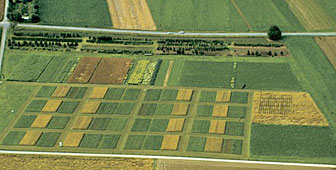Swiss study says organic farming is realistic alternative

In one of the longest-running studies of its kind, Swiss scientists have demonstrated the efficiency of organic farming methods.
Full results, published for the first time after 21 years of research, show that organic yields are 20 per cent smaller on average than those from conventional agriculture but that the ecological benefits more than make up for the difference.
Organic crops, which do not use synthetic fertilizers or pesticides, proved more efficient users of energy and resulted in healthier soils.
The scientists from the research institute of organic agriculture (FiBL) in Frick and the Swiss federal research station for agroecology and agriculture, in Zürich-Reckenholz, concluded that organic production is a viable alternative to conventional ways of farming.
The findings appear in Science magazine although FiBL released a summary of the results two years ago.
Identical conditions
The team led by Paul Mäder compared plots of cropland grown according to organic and conventional methods.
At Therwil near Basel, they grew potatoes, barley, winter wheat, beets and grass clover under the same soil and climatic conditions. Crop rotation, varieties and tillage were also the same.
During the study period, they compared normal organic production, another organic approach called biodynamic farming, based on the environmental philosophies of Rudolph Steiner, and two conventional farming methods.
One of these used mineral fertilisers and farmyard manure; the other did not use manure.
Organic efficiency
Although expenditure on fertilisers and energy was halved and pesticide use was 97 per cent lower, yields of organic crops over the study period were only 20 per cent below the average.
Overall the organic systems were able to produce more with less energy and fewer resources, the researchers reported.
“These results should be encouraging for farmers because they can see that yields are stable over time, and that soil fertility has increased,” said Mäder.
The scientists also found that the organic soils housed a larger and more diverse community of organisms.
These include soil microbes, which govern the nutrient cycling reactions in soils, and mycorrhizae, root-colonizing fungi that help plants absorb the nutrients. These fungi were also at least partly responsible for the more stable physical structure of the organic soils, the researchers said.
Trial continues
Insects, along with pest-eating spiders and beetles, were almost twice as abundant and more diverse, and the scientists also recorded a greater presence of earthworms. The weed flora was also more diverse in the organic systems, including some specialized and endangered species.
“Our results suggest that, by enhancing soil fertility, organic farmers can help increase biodiversity,” said Mäder.
The researchers also found that organic soils decomposed more efficiently. This is an important feature of fertile soil, Mäder explained, because the process releases nutrients and carbon to be used by the plants and microbes.
The research was funded by the Swiss Federal Office for Agriculture and the Swiss National Science Foundation. Although researchers have already published some results, the study is set to continue for at least the next four years.
swissinfo

In compliance with the JTI standards
More: SWI swissinfo.ch certified by the Journalism Trust Initiative
You can find an overview of ongoing debates with our journalists here. Please join us!
If you want to start a conversation about a topic raised in this article or want to report factual errors, email us at english@swissinfo.ch.